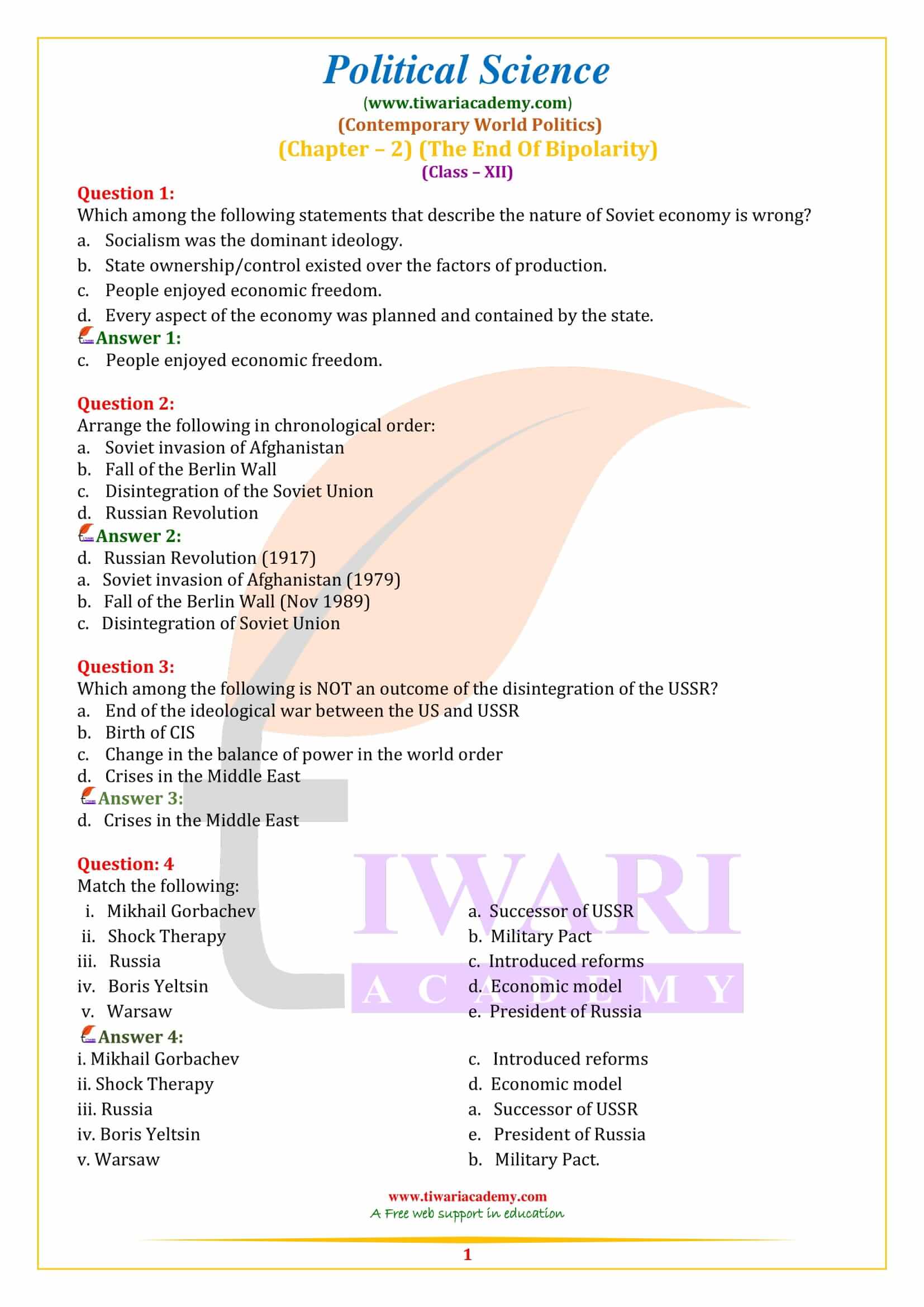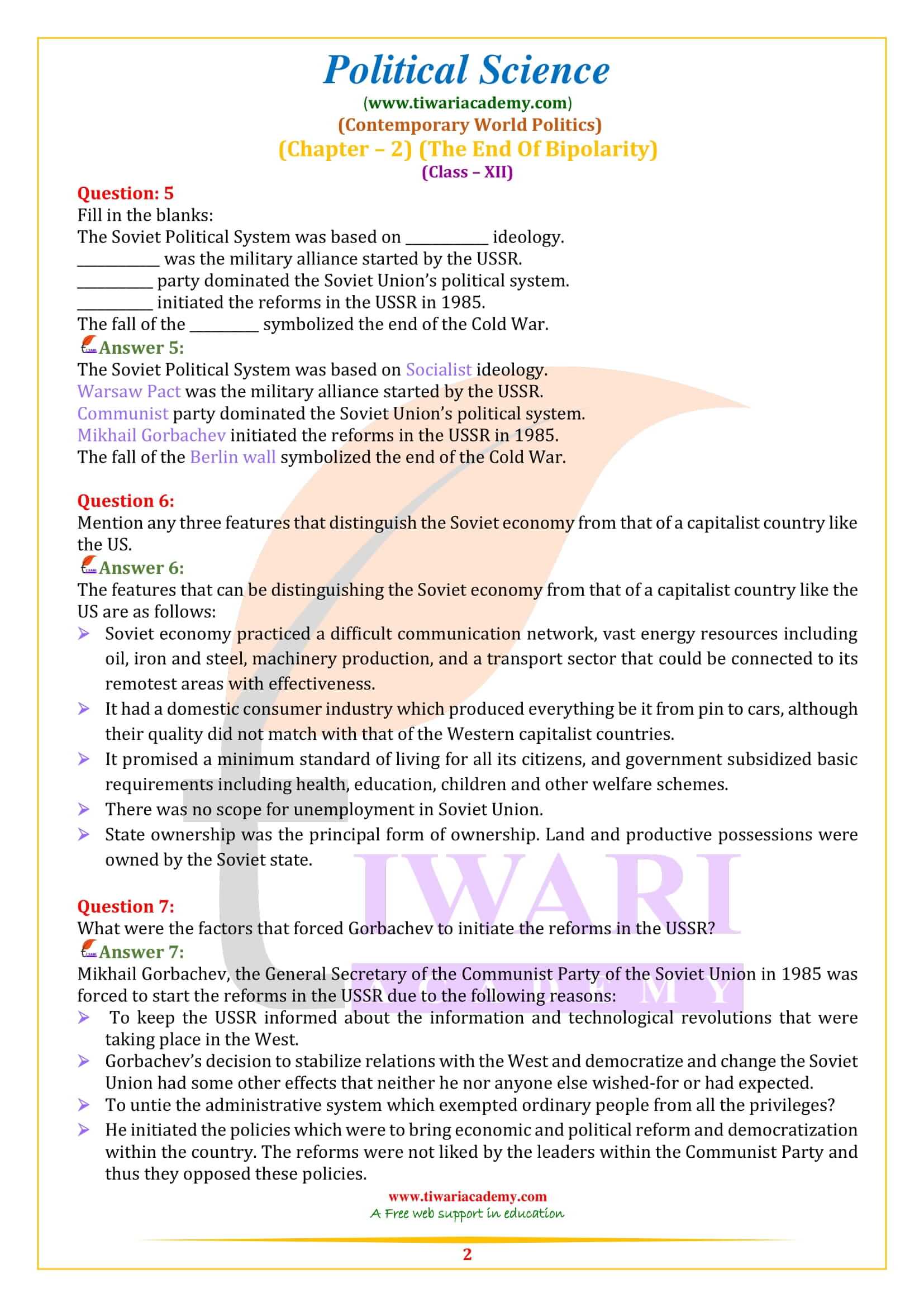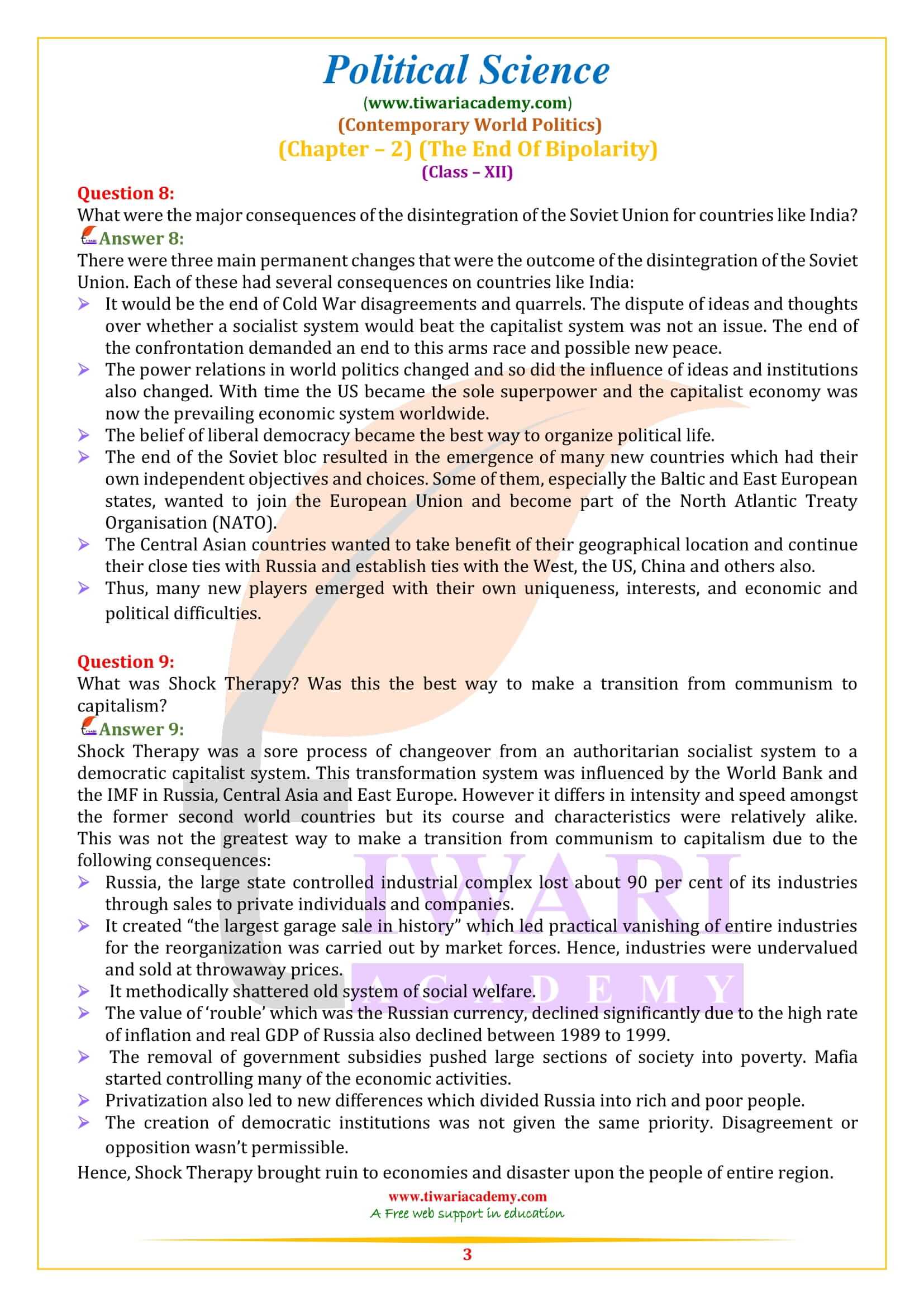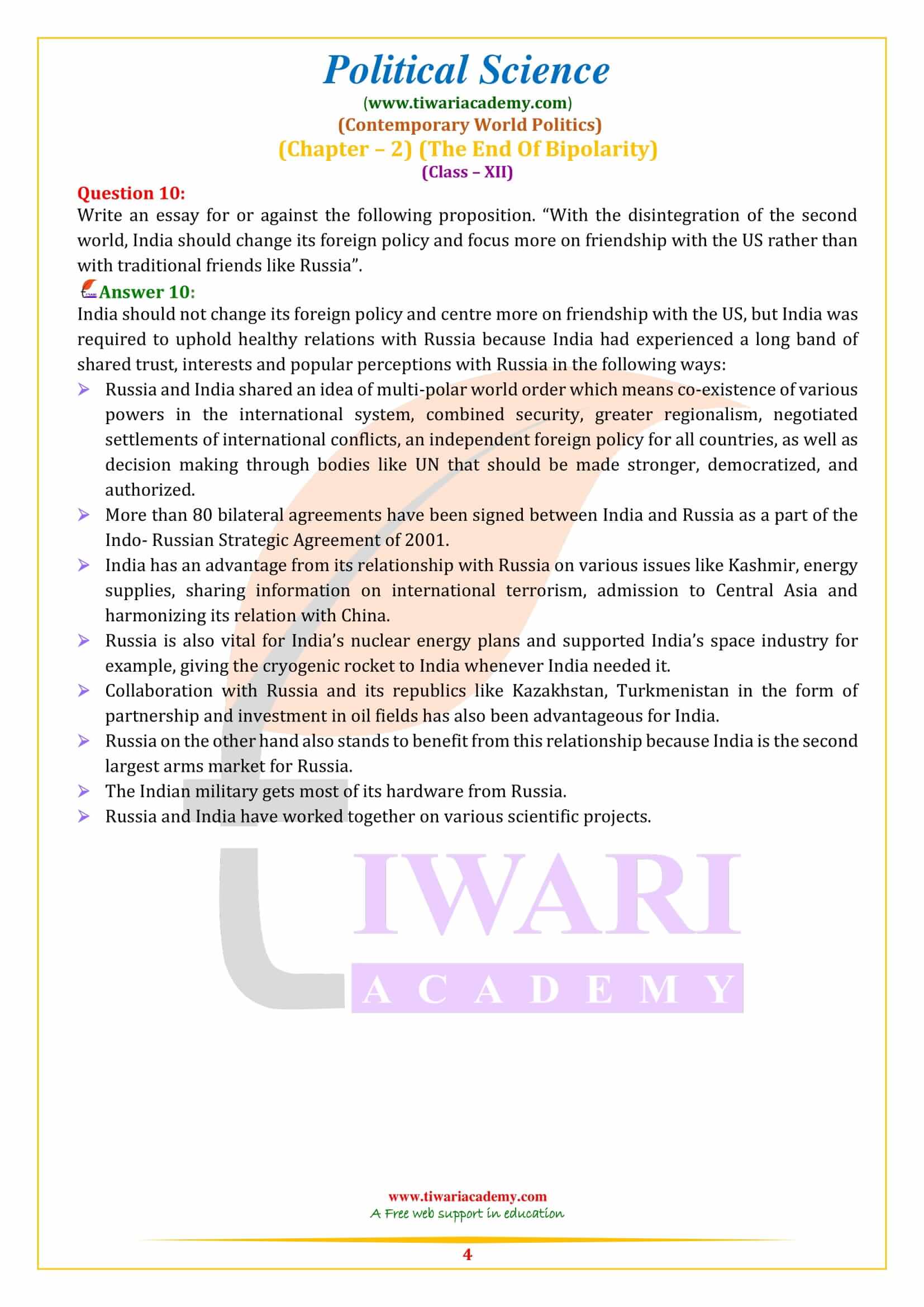NCERT Solutions for Class 12 Political Science Chapter 2 the End of Bipolarity designed and prepared for new academic session 2024-25. Students of CBSE and State board can take the benefits of these useful contents of Class 12 Political Science Part 1 Contemporary World Politics chapter 2.
NCERT Solutions for Class 12 Political Science Chapter 2
Class 12 Political Science Chapter 2 The End of Bipolarity
Class 12 Political Science Chapter 2 MCQ
Which among the following statements that describe the nature of Soviet economy is wrong?
Arrange the following in chronological order, which is the last event
Which among the following is NOT an outcome of the disintegration of the USSR?
Mention any three features that distinguish the Soviet economy from that of a capitalist country like the US.
The features that can be distinguishing the Soviet economy from that of a capitalist country like the US are as follows:
- Soviet economy practiced a difficult communication network, vast energy resources including oil, iron and steel, machinery production, and a transport sector that could be connected to its remotest areas with effectiveness.
- It had a domestic consumer industry which produced everything be it from pin to cars, although their quality did not match with that of the Western capitalist countries.
- It promised a minimum standard of living for all its citizens, and government subsidized basic requirements including health, education, children and other welfare schemes.
- There was no scope for unemployment in Soviet Union.
- State ownership was the principal form of ownership. Land and productive possessions were owned by the Soviet state.
What were the factors that forced Gorbachev to initiate the reforms in the USSR?
Mikhail Gorbachev, the General Secretary of the Communist Party of the Soviet Union in 1985 was forced to start the reforms in the USSR due to the following reasons:
- To keep the USSR informed about the information and technological revolutions that were taking place in the West.
- Gorbachev’s decision to stabilize relations with the West and democratize and change the Soviet Union had some other effects that neither he nor anyone else wished-for or had expected.
- To untie the administrative system which exempted ordinary people from all the privileges?
- He initiated the policies which were to bring economic and political reform and democratization within the country. The reforms were not liked by the leaders within the Communist Party and thus they opposed these policies.
What were the major consequences of the disintegration of the Soviet Union for countries like India?
There were three main permanent changes that were the outcome of the disintegration of the Soviet Union. Each of these had several consequences on countries like India:
- It would be the end of Cold War disagreements and quarrels. The dispute of ideas and thoughts over whether a socialist system would beat the capitalist system was not an issue. The end of the confrontation demanded an end to this arms race and possible new peace.
- The power relations in world politics changed and so did the influence of ideas and institutions also changed. With time the US became the sole superpower and the capitalist economy was now the prevailing economic system worldwide.
- The belief of liberal democracy became the best way to organize political life.
- The end of the Soviet bloc resulted in the emergence of many new countries which had their own independent objectives and choices. Some of them, especially the Baltic and East European states, wanted to join the European Union and become part of the North Atlantic Treaty Organisation (NATO).
- The Central Asian countries wanted to take benefit of their geographical location and continue their close ties with Russia and establish ties with the West, the US, China and others also.
- Thus, many new players emerged with their own uniqueness, interests, and economic and political difficulties.
What was Shock Therapy? Was this the best way to make a transition from communism to capitalism?
Shock Therapy was a sore process of changeover from an authoritarian socialist system to a democratic capitalist system. This transformation system was influenced by the World Bank and the IMF in Russia, Central Asia and East Europe. However it differs in intensity and speed amongst the former second world countries but its course and characteristics were relatively alike.
This was not the greatest way to make a transition from communism to capitalism due to the following consequences:
- Russia, the large state controlled industrial complex lost about 90 per cent of its industries through sales to private individuals and companies.
- It created “the largest garage sale in history” which led practical vanishing of entire industries for the reorganization was carried out by market forces. Hence, industries were undervalued and sold at throwaway prices.
- It methodically shattered old system of social welfare.
- The value of ‘rouble’ which was the Russian currency, declined significantly due to the high rate of inflation and real GDP of Russia also declined between 1989 to 1999.
- The removal of government subsidies pushed large sections of society into poverty. Mafia started controlling many of the economic activities.
- Privatization also led to new differences which divided Russia into rich and poor people.
- The creation of democratic institutions was not given the same priority. Disagreement or opposition wasn’t permissible.
Hence, Shock Therapy brought ruin to economies and disaster upon the people of entire region.
Write an essay for or against the following proposition. “With the disintegration of the second world, India should change its foreign policy and focus more on friendship with the US rather than with traditional friends like Russia”.
India should not change its foreign policy and centre more on friendship with the US, but India was required to uphold healthy relations with Russia because India had experienced a long band of shared trust, interests and popular perceptions with Russia in the following ways:
1. Russia and India shared an idea of multi-polar world order which means co-existence of various powers in the international system, combined security, greater regionalism, negotiated settlements of international conflicts, an independent foreign policy for all countries, as well as decision making through bodies like UN that should be made stronger, democratized, and authorized.
2. More than 80 bilateral agreements have been signed between India and Russia as a part of the Indo- Russian Strategic Agreement of 2001.
3. India has an advantage from its relationship with Russia on various issues like Kashmir, energy supplies, sharing information on international terrorism, admission to Central Asia and harmonizing its relation with China.
4. Russia is also vital for India’s nuclear energy plans and supported India’s space industry for example, giving the cryogenic rocket to India whenever India needed it.
5. Collaboration with Russia and its republics like Kazakhstan, Turkmenistan in the form of partnership and investment in oil fields has also been advantageous for India.
6. Russia on the other hand also stands to benefit from this relationship because India is the second largest arms market for Russia.
7. The Indian military gets most of its hardware from Russia.
8. Russia and India have worked together on various scientific projects.






